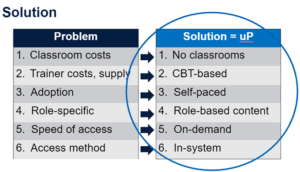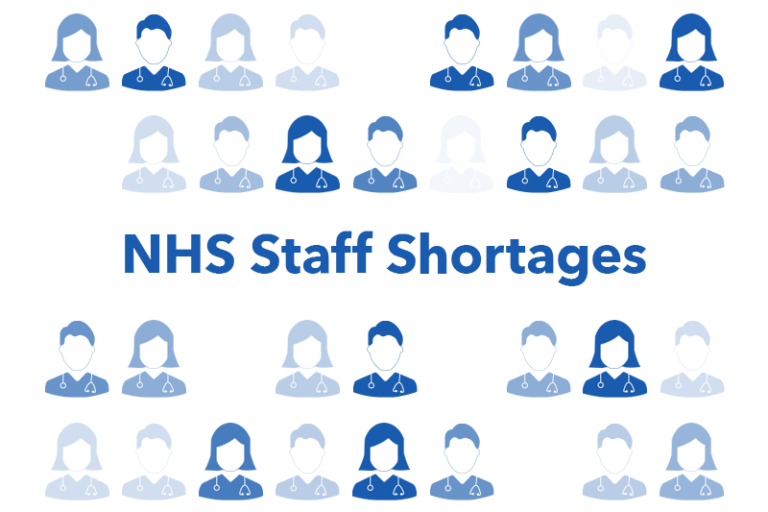
Liz Griffith
uPerform
Director, EHR Education
Welcome to the uPerform Thought Leader series, a collection of articles penned by industry leaders committed to improving health IT training and sharing their knowledge. Liz Griffith serves as the Director of EHR Education at uPerform and is a fiercely passionate champion for health IT training. Prior to her role at uPerform, Liz served as the Director of Customer Insights at KLAS Research, leading EHR satisfaction consulting and measurements.
I have been riding a bit of a high for the past few weeks since attending the HETT conference in London. That’s partly because this was my first visit across the pond, and I spent a few days after in the awe-inspiring beauty of the English and Welsh countryside. But it’s also probably because our session at HETT was the most popular case study at the event.
I distinctly remember the energy in the crowd attending our session. David Kwo, former NHS CIO and current uPerform advisor, and I had the opportunity to discuss the problems facing NHS Trusts as they look to improve EPR training. I recall looking out at the audience and seeing many head nods and whispers of “Yes!” as we talked about the challenges of the “traditional training model.” Whether the audience members were making the leap to full digitization at their respective Trusts or wondering how to make the most of the EPR systems they have already implemented, it was clear that these challenges resonated with them.
David opened the conversation outlining the way EPR training is traditionally thought of – for senior leaders, just a necessary evil that must be delivered to new hires and ahead of go-lives with an “I am so glad that is over” mentality. All the while, clinicians walk away wanting more training to help them feel competent, and yet that additional training often never comes.
He outlined the challenges that Trusts face to continue delivering EPR training in an instructor-led model where many may not even have access to the system they are being trained on yet. Studies show this model results in low knowledge retention. Furthermore, it fails to drive deep adoption of technology or workflows, struggles to keep pace with change and incurs high costs in terms of both personnel and physical space. David shared his own struggles with these issues as a former CIO before proposing a move to virtual self-directed training with uPerform, stating “I wish I had a product like this when I was struggling to bring EPR training to my Trust”.
David also shared this problem and solution matrix with the audience, explaining the various ways that many systems in the US are utilizing uPerform to address common EPR challenges.
David then turned the conversation over to me to share the kind of successes we are seeing with systems here in the US. I watched the crowd’s reactions as I shared the transformations we have seen with the use of microlearnings. One such example was M Health Fairview, which embedded a microlearning video directly into their new Epic eConsent tool and increased adoption and utilization of the tool from 7% to 87% in a matter of days.
I talked about how we often see hesitation when we talk about virtual self-directed, just-in-time EPR training as though it means a clinician will never get the chance to interact with a real-life trainer again. I shared how Gundersen Health System has turned its trainers into coaches. With uPerform, Gundersen’s education team can efficiently create up-to-date content across the entirety of the EPR. Not only are their trainers now more adept at creating content for a multitude of modules, but Gundersen has freed up time for each trainer to also serve as a one-on-one coach. Clinicians at Gundersen utilize what they have branded as EnlightenMe Labs to work through the self-directed portion of their training. Once clinicians have completed those training modules, they are prompted to schedule a “coaching session” where they can ask specific questions regarding their workflows, setup personalisations and more.
As I looked out across the audience while sharing these success stories there was hope in the eyes of the participants. The NHS is perfectly poised to take a huge step in the right direction years ahead of where the US was over a decade ago. They have the opportunity to think very strategically about their EPR implementation and ongoing education plans. They can learn from those who have struggled down this path and are finally realizing the pitfalls of the traditional training models. They can begin taking advantage of the proven and rapid success of just-in-time EPR training with uPerform.
Before I could even step off the stage, an NHS Trust leader passionately shared how she’s been walking the halls of her Trust with her clinicians, feeling their fear and trepidation about their impending go-live with an EPR. It is their first major switch from using paper charts. This is a monumental undertaking, and the clinicians feel that weight. She wants desperately to have something to relieve that fear they felt. She knows they don’t have a solid strategy in place for how they are going to train on this new EPR, but she has hope that she will soon be able to take some of the strategies we discussed and bring a more innovative training approach to her Trust.
Related Articles
Deliver EPR training with uPerform
Looking for a better way to deliver EPR training and ensure a successful digital transformation? Contact us today to schedule a demo and learn more about how uPerform can help reduce training costs and improve user experience with the EPR.








